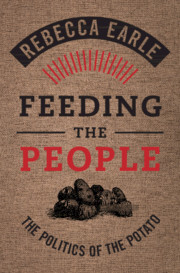Book contents
- Feeding the People
- Feeding the People
- Copyright page
- Dedication
- Contents
- Figures
- Recipes
- Abbreviations
- Introduction Pouring Ourselves a Large Gin
- Chapter 1 Immigrant Potatoes
- Chapter 2 Enlightened Potatoes
- Chapter 3 Free-Market Potatoes
- Chapter 4 Global Potatoes
- Chapter 5 Capitalist Potatoes
- Chapter 6 Security Potatoes
- Conclusions Parmentier, Peasants and Personal Responsibility
- Acknowledgements
- Notes
- Bibliography
- Index
Chapter 3 - Free-Market Potatoes
Published online by Cambridge University Press: 25 June 2020
- Feeding the People
- Feeding the People
- Copyright page
- Dedication
- Contents
- Figures
- Recipes
- Abbreviations
- Introduction Pouring Ourselves a Large Gin
- Chapter 1 Immigrant Potatoes
- Chapter 2 Enlightened Potatoes
- Chapter 3 Free-Market Potatoes
- Chapter 4 Global Potatoes
- Chapter 5 Capitalist Potatoes
- Chapter 6 Security Potatoes
- Conclusions Parmentier, Peasants and Personal Responsibility
- Acknowledgements
- Notes
- Bibliography
- Index
Summary
The Enlightenment’s promotion of the potato reflect the close relationship between new ideas about the political importance of everyday eating habits, and new ways of thinking about the economy. Just as Adam Smith recommended that allowing individuals to pursue their own interests would ultimately result in a flourishing economy, so potato-enthusiasts (Smith included) argued that the best way to build a robust population was to empower individuals to make sound dietary choices through campaigns of information and exhortation. Rarely did they suggest that people be obliged to grow or eat potatoes. Such suggestions would have run counter to the entire philosophy that underpinned much enlightened interest in food supply: the new discipline of political economy. This history reveals the eighteenth-century origins of the current, neoliberal, insistence that healthy eating is best understood as a form of individual consumer empowerment that at the same time builds a stronger economy and body politic. Potatoes offer a concrete, everyday example of how this confluence of private interest and public benefit was imagined to occur, at the very moment when these ideas were first theorised.
Keywords
- Type
- Chapter
- Information
- Feeding the PeopleThe Politics of the Potato, pp. 79 - 106Publisher: Cambridge University PressPrint publication year: 2020



